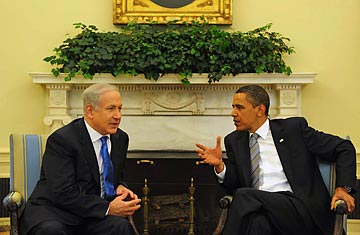
President Barack Obama, right, speaks with Israeli Prime Minister Benjamin Netanyahu
No one should have been surprised that there was no meeting of minds between President Barack Obama and Israeli Prime Minister Benjamin Netanyahu at their inaugural summit on Monday. Although the two men proclaimed a shared commitment to having Israelis and Palestinians live in peace, their views on how to get there remain substantially at odds. Now, as Obama puts the finishing touches on a new peace plan to be unveiled shortly — perhaps when he addresses the Muslim world from Cairo next month — the question facing the Administration is how to pursue its strategy with an unenthusiastic Israeli partner.
At the White House, Netanyahu pointedly refused to endorse the principle of Palestinian statehood, a cornerstone both of the peace process and of U.S. Middle East policy. The Israeli leader made clear that he wants the Palestinians to govern themselves but added the caveat that self-governance would be "absent a handful of powers that could endanger the State of Israel." (Netanyahu believes Israel's security cannot tolerate the Palestinians having such typical features of statehood as sovereign control over their own borders, air space and defense and foreign policies.) And while he committed to holding talks with the Palestinian Authority, he added a new precondition for peace, requiring that the Palestinians recognize Israel as a "Jewish state." Palestinian Authority President Mahmoud Abbas, who will visit the White House next week, has thus far rejected that demand both out of concern for Israel's Arab minority and because the rights of Palestinian refugees have remained an issue on the negotiating agenda of the peace process up till now. (See pictures of life in Gaza under Hamas.)
Obama has relinquished the previous Administration's approach by prioritizing the Israeli-Palestinian conflict in the first year of his first term, by showing a willingness to press the Israelis to live up to their commitments under previous agreements — particularly with respect to building settlements on land captured in 1967 — and by raising regional expectations that the U.S. will commit to pressing for a two-state solution. But how can Obama's resolve to move the process forward be turned into policy? (See pictures of 60 years of Israel.)
The approach adopted by the Clinton Administration — bringing Israel and the Palestinians together in bilateral negotiations facilitated and supported by the U.S. — is not likely to produce results today. The moderate Abbas, who really reigns only over the West Bank, now speaks for just a fraction of Palestinian public opinion, and Israel's security chief, Yuval Diskin, warned on Tuesday that Hamas (which controls the other Palestinian enclave, Gaza, outright) would win any Palestinian election held right now.
Meanwhile, Israel's government is built on a right-wing consensus at odds with such fundamentals of the peace process as Palestinian statehood, freezing and evacuating West Bank settlements, and sharing Jerusalem. But even when Israel was led by the centrist Ehud Olmert, Abbas reportedly rejected the best peace deal the Israeli leader was able to offer during last year's talks about talks — an offer that reportedly conceded more territory to the Palestinian state than the deal turned down by Yasser Arafat at Camp David. So the gulf between Israel's best offer and the bottom line of the most moderate Palestinian leadership appears to be too large to resolve in bilateral negotiations in which the Palestinians have no leverage but nothing to lose, while the Israeli public is able to live with the status quo for the foreseeable future.
